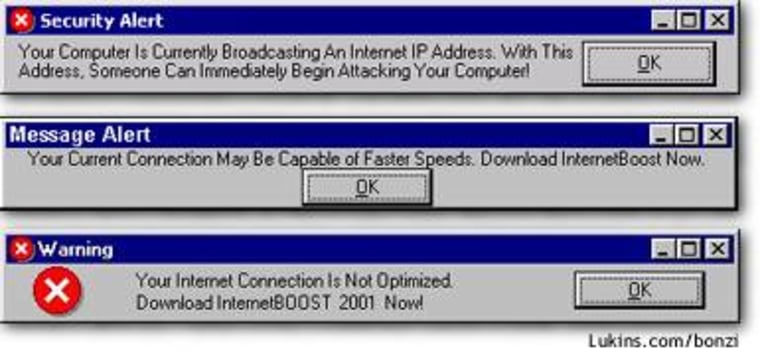The maker of Bonzi Buddy software has agreed to change some of its Internet advertising practices as part of a settlement of a lawsuit that alleged it was deceptive, the attorney bringing the lawsuit said Tuesday. At issue are online ads that mimic Windows system warnings or tell users that their computers are “broadcasting” their IP addresses. The settlement, which was approved Friday in Washington state Superior Court, could have a ripple effect on other Internet advertisers who use such tricks to get clicks.

BONZI BUDDY’S most familiar product is an animated purple ape that sits on users’ computer screens and makes Web site recommendations. But California-based Bonzi also attempts to drive traffic to its family of Web sites through aggressive banner advertisement campaigns.
Some of those banner ads — which often looked like Windows dialogue boxes — were deceptive, said attorney Darrell Scott of the Washington state firm Lukins & Annis, which brought the suit against Bonzi last November and was seeking class-action status. Philip J. Carstens, an attorney in the same law firm, volunteered to serve as the initial plaintiff in the case after a frustrating 20-minute bout with a Bonzi banner ad, Scott said.
While Bonzi agreed in the settlement to stop using “fake user interfaces” in its advertising, the company maintains it did not engage in illegal advertising.
“Bonzi Software, Inc. believes that it never violated any law with regards to its advertising practices and simply settled to avoid the high cost of litigation,” Bonzi attorney Sara Rizzo said through e-mail. “Bonzi ... takes great pride in its Internet products and strives to maintain high standards in all of its business practices.”

Under the settlement terms, provided by Scott, Bonzi agreed to a list of changes in its advertising practices:
Future Bonzi ad banners designed to look like Windows dialogue boxes will contain the word “Advertisement” — and it will be the same size as other words in the header.
Bonzi ads won’t contain minimize, maximize, or “x” buttons that do not actually perform their usual function.
“OK” buttons on such dialogue boxes will be changed to read “More Info.”
Bonzi’s ads will also no longer assert that users’ computers are “broadcasting” their IP addresses.
The company has 30 days to implement the changes, Scott said, adding the company would also pay plaintiff’s legal fees.
“We really got everything we asked for,” Scott said. “We are very pleased that Bonzi came to the table ... and we achieved a settlement.”
SIMILAR LAWSUITS IN THE OFFING Bonzi’s purple ape may seem just an Internet curiosity, but the company was at one time a Web powerhouse. And the lawsuit alleged that Bonzi is behind several massive Internet marketing campaigns, including one that placed 37 million banner ads during a single week in 2001. In total, the filing claimed, Bonzi had blanketed the Internet with 300 million banner ads — and at one time, Bonzi was the third-most visited software company Web site in the world, behind only Microsoft and Netscape.
Lukins & Annis has already filed a similar lawsuit against another advertiser, eAcceleration Software, alleging similar practices. And three other companies are likely lawsuit targets, Scott said. He wouldn’t name those companies, but he said he hoped the settlement had “a sobering effect” on other firms.
It might, said Internet law expert Bart A. Lazar, of the Seyfarth Shaw law firm in Chicago.
“It has a deterrent effect ... companies are going to think twice about it,” Lazar said.
The success of a civil plaintiff might encourage other lawsuits and it also might encourage state attorneys general to look into the practice, he said.
“This gives interactive advertisers something to think about, to look at their advertisements on the Internet and make sure their aggressive advertisements don’t look like something else.”